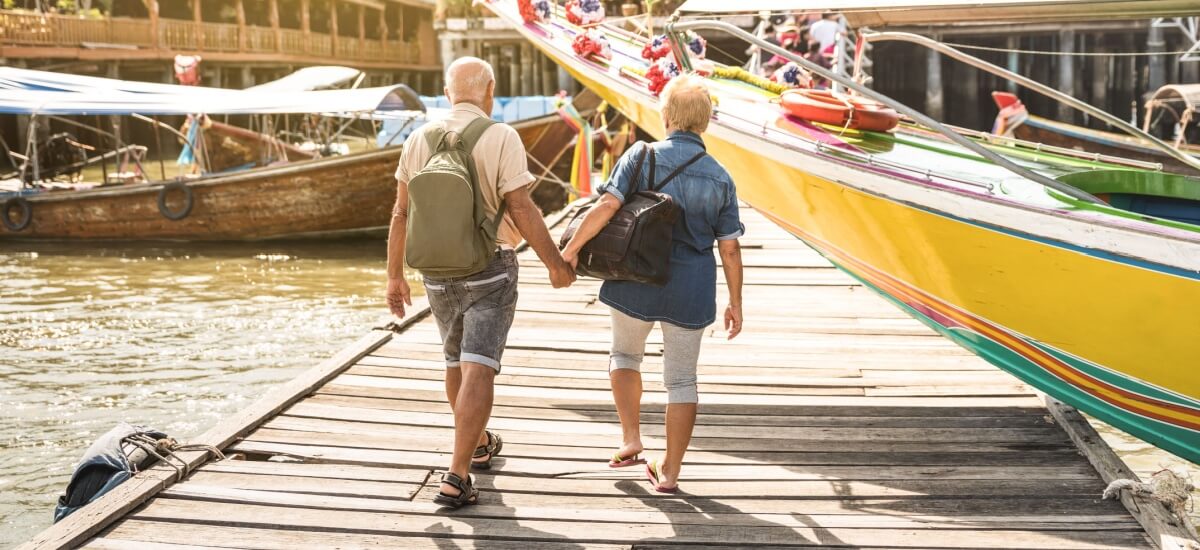Expat tax in Thailand: What you need to know as a UK expat
Read our helpful guide to expat taxes in Thailand, including info on how British expats are taxed in Thailand and current personal income tax rates.

Dreaming of moving to a vibrant country like Thailand? You’re certainly not alone, since over 40,000 British expats already live there.¹ In this guide, we’ll cover everything you need to know about moving to Thailand from the UK, including the cost of living, whether anything has changed for Brits after Brexit and much more.
We’ll also point out a cost-effective way to manage your money across borders from the money services provider Wise. Open a Wise account and you can send money between the UK and Thailand for low fees and the mid-market exchange rate.
Want to take your savings with you? Wise can also help you with large transfers.
Yes, you can move to Thailand from the UK as long as you meet the criteria, have the right documents and follow all the rules. We’re going to take you through the steps and the available routes.
Since Thailand is not a European country, Brexit has no effect on anyone moving to Thailand from the UK.
There are four main types of visas that Thailand offers to foreigners: tourist, transit, Non-immigrant and SMART visa.
The Non-immigrant visa is made for foreigners who visit Thailand for purposes other than tourism. In other words, this is a long-term visa for those who want to stay in Thailand for a certain period of time.
There are ten types of the Non-immigrant visa. What differentiates them is either your profession or the purpose of your stay. Here’s a list:
You can also apply for the SMART visa. It’s made for investors, high-skilled workers or entrepreneurs who want to invest in certain industries in Thailand. Each subcategory has certain financial conditions, in terms of the amount of money you’re earning or investing.³
Another new visa type is Thailand’s Long-Term Resident visa (LTR), made for four categories of foreigners - Wealthy Global Citizens, Wealthy Pensioners, Work-from-Thailand Professionals and Highly-Skilled Professionals. Although the eligibility criteria is pretty restrictive, the visa is valid for 10 years and you can renew it. This is a good option for digital nomads, as long as you meet the conditions.⁴
The first step is visiting a Thai Embassy or Consulate and applying for your visa of choice. Make sure you contact them beforehand to find out exactly which documents you need to provide.
After 90 days on your Non-immigrant visa, you can apply for a one-year extension and a re-entry permit. Then, once you’ve spent three years in Thailand legally, you can apply for permanent residence. You can even apply for citizenship five years into your permanent residence.
Pretty much the only way to get to Thailand from the UK is by plane. At the moment, the cheapest month to fly is February, when you can get a one-way ticket for £208.
However, you can expect the average ticket prices to be higher. Since it’s not always possible to find a good deal, a more realistic price is between £300 and £400 for a one-way ticket.
| 📚 Read more: How to use the UK-issued Wise card abroad? |
|---|

Thinking about spending your retirement in a tropical paradise? Whether you’re already approaching that age or just thinking ahead, Thailand can be a great option.
But how easy is it to retire in Thailand? Here are the things you should be aware of:
Thailand’s retirement visa is better known as the O category Non-immigrant visa. There are two subcategories of this visa - the O-A and O-X. You have to be at least 50 years old in order to apply for either one of them.
The O-A visa is only valid for a year. In order to apply, you need to have a monthly income of 65,000 THB or an 800,000 THB security deposit in a Thai bank.
The O-X visa is only available to citizens of certain countries, the UK included. It allows you to stay in Thailand for 10 years. The financial requirements for this visa category are either a 3,000,000 THB deposit in a Thai bank or an annual income of 1,200,000 THB.
If you manage to retire in Thailand, know that you can claim your UK state pension or new UK State Pension there. We recommend contacting the International Pension Centre to get the most recent information.
Here are some basic facts for you to know about Thailand if you’re considering moving there:
Ahead of moving to another country, it’s good to know what you can expect when it comes to living costs.
In general, the cost of living in Thailand is much lower than in the UK. On average, you’ll pay over 60% less for rent and around 30% less for groceries. Of course, prices depend on many things, such as the city you live in.
Let’s take a look at a few average prices for common spending categories in Thailand, compared with the UK:
If you want to buy an apartment in Thailand, this is also much more affordable than in the UK. For instance, the price per square metre for a city centre apartment is over 45% lower compared to the UK.

Thailand is known for having very good, affordable healthcare. Citizens and working legal residents have access to the public healthcare sector.
Many expats have private health insurance as well, which is more expensive, but still relatively affordable. The quality of the staff and equipment in private Thai hospitals have made Thailand a popular medical tourist destination.
Opening a local Thai bank account should be one of the first steps in your new life abroad. It’s essential for paying rent and utility bills, as well as everyday expenses and withdrawals as cash is widely used in Thailand. Also, managing your money will be easier.
Most banks in Thailand won’t let you open an account online. Instead, it’s necessary to go in person and bring certain documents, such as your visa and passport. Some banks will ask for other things, such as proof of Thai residency or proof of property ownership, but you should check with your bank of choice directly.
You should also ask whether you can keep your UK bank account while living in Thailand.
And, as an alternative to a bank account, check out the Wise account. You can send, receive, and spend in multiple currencies, including British pounds and Thai baht. It’s not a bank account but offers many similar features.
Learn more about the Wise account 💰
Many expats already have a job lined up before arriving in Thailand, since that can help them get a visa. Both the Non-immigrant and SMART visa are job-dependent. However, some small companies don’t want to bother with handling documentation and helping expats apply, but don’t let that discourage you.
There are many job search portals and recruitment agencies which can help you find employment in Thailand. For example, JobsDB and JobThai are popular websites, while Hays and RECRUITdee are recruitment firms. If you’re the entrepreneur type, you could consider starting a business in Thailand.
Finding a place to live is one of the most important things when starting a life in a new country. Whether you’re renting or buying property in Thailand, deciding on a suitable apartment will most likely require patience.
Even when it comes to renting, you should consider hiring a real estate agent. This way, an expert can help you find just what you’re looking for. If you’d like to get an idea of the apartment offer in Thailand, these are some popular property websites:
If you’re interested in buying, know that foreigners aren’t allowed to buy land in Thailand. The only way to go around this is setting up a private limited company with over 50% Thai ownership. However, you can buy apartments and condominiums without complications.
| 📚 Read more: How to transfer large amounts of money from the UK? |
|---|
Let’s go through the most important steps of moving to Thailand:
Before moving to a new country, you’re likely to have lots of costs to cover. Some of these, such as real estate costs, visa application fees and rental deposits, will need to cross borders.
Open a Wise account and you can send money between the UK and Thailand for low, transparent fees and the mid-market exchange rate. It’s not a bank account but offers many similar features.
You can also use Wise once you arrive in your new home. For starters, you can spend in THB from the moment you step off the plane using your contactless Wise card. It works in 150+ countries and automatically converts your pounds to the local currency whenever you spend, only adding a tiny, upfront currency conversion fee.
Sources used:
Sources last checked on date: 29-Apr-2024
*Please see terms of use and product availability for your region or visit Wise fees and pricing for the most up to date pricing and fee information.
This publication is provided for general information purposes and does not constitute legal, tax or other professional advice from Wise Payments Limited or its subsidiaries and its affiliates, and it is not intended as a substitute for obtaining advice from a financial advisor or any other professional.
We make no representations, warranties or guarantees, whether expressed or implied, that the content in the publication is accurate, complete or up to date.

Read our helpful guide to expat taxes in Thailand, including info on how British expats are taxed in Thailand and current personal income tax rates.

Learn everything you need to know about expat health insurance for Thailand, from finding the best providers to accessing healthcare and managing costs.

Read our guide to living in Thailand as an expat, covering cost of living, job opportunities, healthcare and more.

Here's how to use Wise for Property Purchases and Long-Term Stay Visa Applications and Renewals in Thailand.

Read our guide on the risks of buying property in Thailand and avoid the most common mistakes.

Explore the pros and cons of living in Thailand in our guide. We’ll also discuss if Thailand is safe for expats and the best places to live in the country.